10 Worst Foods for Sleep
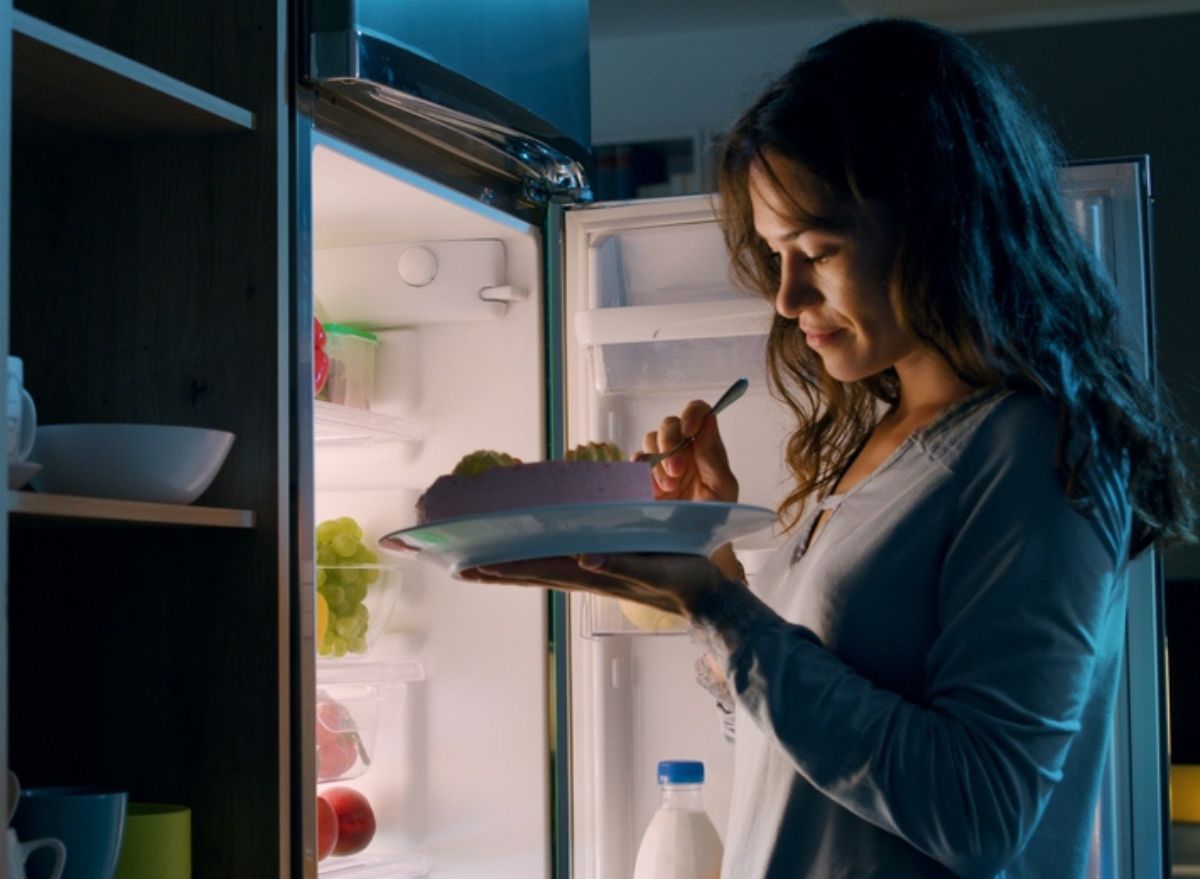
You’re lying awake at night, staring at the clock, waiting for sleep to come. What could be keeping you up? Was it something you ate? It’s certainly possible because the foods we eat before bed can have a surprising impact on the quality of our rest. Bedtime snacks that disrupt our blood sugar, rev up our nervous system, or mess with our digestion are common culprits behind sleepless nights. Even some foods that are quite healthy could still be considered the worst foods for sleep.
If you’re looking to get better shuteye, stay away from these 10 foods and drinks before bedtime. Then, for ideas on what is best to eat to help you slumber, check out the 8 Best Foods to Help You Sleep.
French Fries
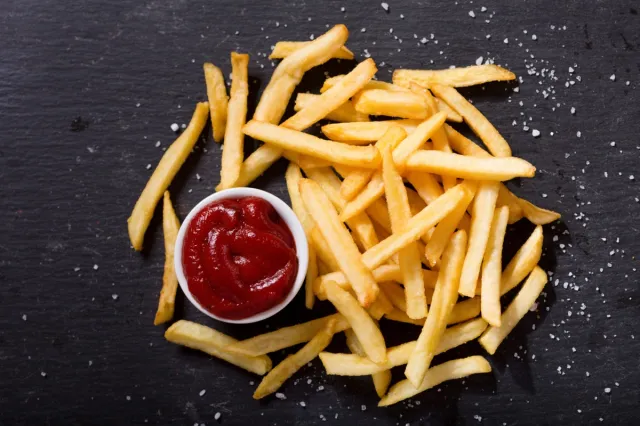
Because fried foods are high in fat, they tend to be hard on your digestive tract. Choices like French fries shortly before bed may cause indigestion, leaving you uncomfortable as you try to sleep.
Tacos
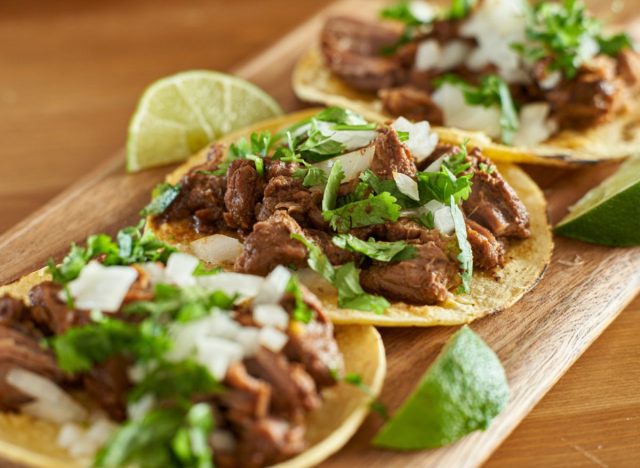
Forget about Taco Bell’s late-night “Fourthmeal”—tacos are a double whammy of high fat and spice that could add up to sleep disruption.
Spicy foods aggravate acid reflux, a condition that may give you chest pangs, sour burps, or stomach pain when you lie down. Enjoy your tacos well before bedtime, not as a midnight fast food run.
Red Chili Pepper
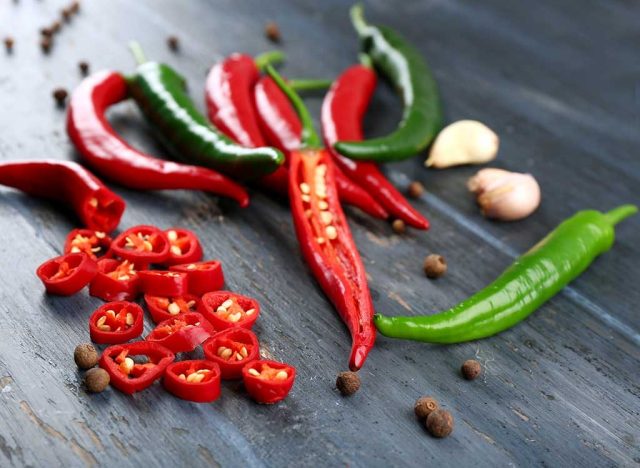
Speaking of spice, there’s no zippier ingredient than red chilies. Though the capsaicin in these spicy peppers is known for benefits like reducing inflammation and even alleviating pain, it’s not so great for lulling you to sleep.
One study found that red chili peppers aggravated acid reflux in patients with GERD. If you’re prone to reflux—especially the kind that disrupts your sleep—pass on spicy chilies.
Cheeseburgers
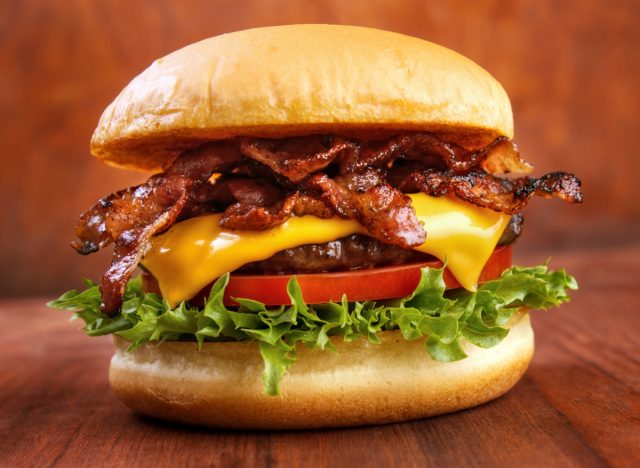
No one ever said a cheeseburger was a healthy bedtime snack. But this high-fat entrée might not just do damage to your waistline—burgers can also mess with your sleep.
As a high-fat food, they’re tough to digest, potentially causing GI upset as you try to wind down.
Citrus Fruits
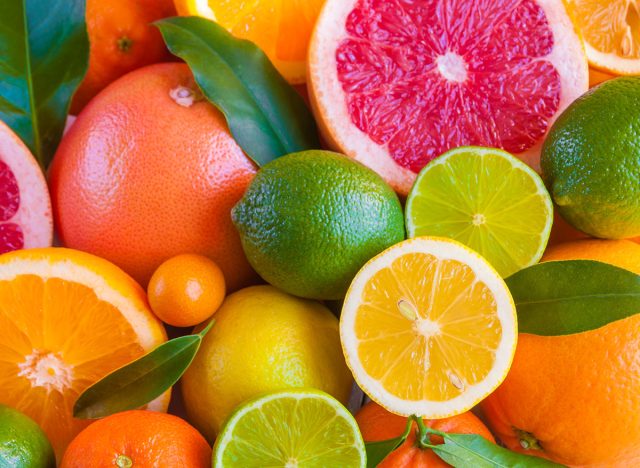
Oranges, grapefruits, lemons, and limes have plenty to offer for your health, from their high vitamin C content to their ample fiber. Then again, at bedtime, they may not be an ideal snack.
The acidity in citrus fruits is another acid reflux trigger. For a fruit treat in the evening, try tart cherries (or their juice) instead. Research shows they can promote better sleep.
Candy
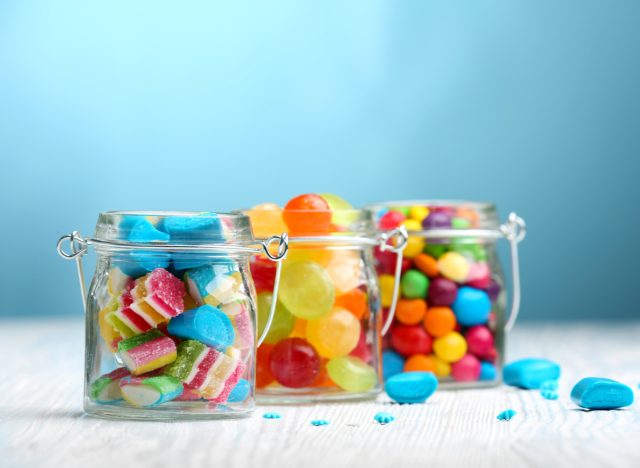
Sugar may not make you hyper as folk wisdom used to say, but a spike in blood sugar is the last thing you need when you want to sleep. Unfortunately, that’s exactly what eating candy before bed will give you, so steer clear of the sweets before hitting the hay.
Research from 2022 found an association between a high-sugar diet and poor sleep quality and duration.
Energy Drinks
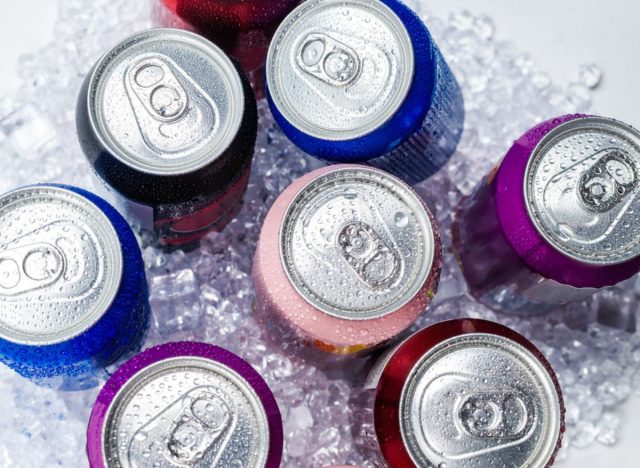
For obvious reasons, energy drinks are Enemy Number One to sleep. With natural and synthetic stimulant ingredients, they’re pretty much the opposite of calming.
A 2019 study on university students found a statistically significant association between energy drink consumption and poor sleep quality. If you choose to down a Red Bull or Rockstar, make it at least eight hours before bedtime.
Coffee
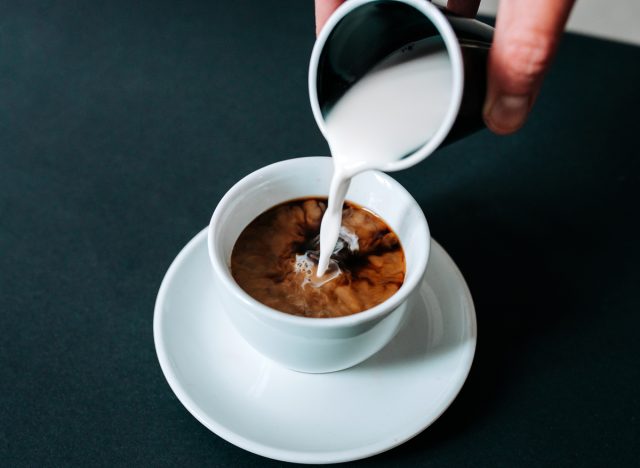
But first, coffee… except when we’re talking about sleep. Java is notorious for disrupting slumber due to its caffeine content. Some research suggests that drinking coffee even as much as six hours before bedtime can have negative effects on nighttime rest. You may be shocked at what cutting back does for your sleep.
Caffeinated Tea
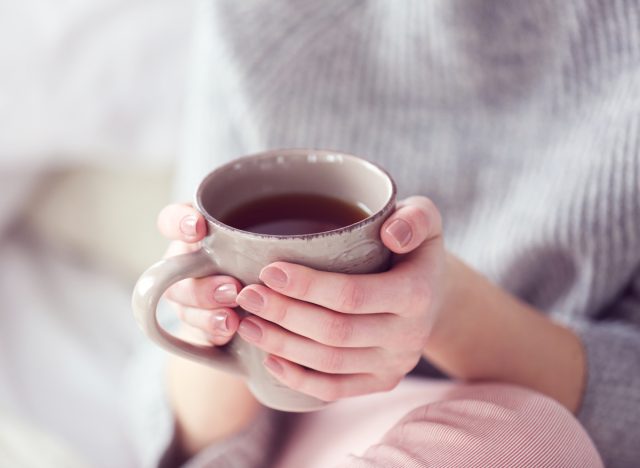
Both green and black tea are full of antioxidants that are excellent for reducing inflammation. But enjoy them with breakfast, not as a nightcap, because these teas can contain significant amounts of caffeine that may keep you awake.
According to the Mayo Clinic, brewed green tea typically has 28 milligrams of caffeine per cup, while the same amount of brewed black tea supplies 47 milligrams.
If you’re really hankering for a soothing cup of tea at night, simply switch to a decaffeinated variety, such as an herbal blend or one formulated to promote sleep.
Alcohol
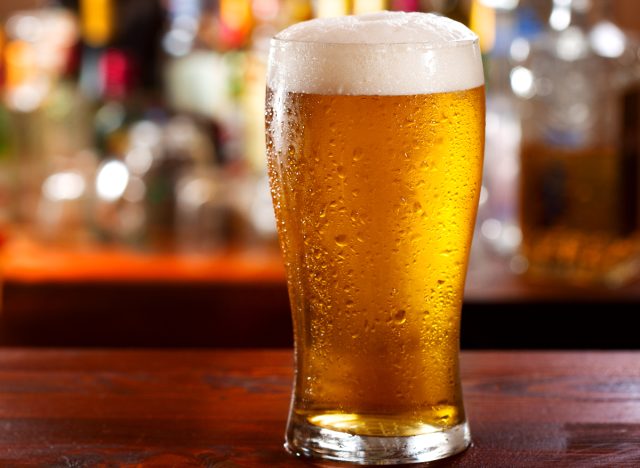
Sure, alcohol might make you feel relaxed in the short term. As a sleep tonic, though, it leaves a lot to be desired. Imbibing alcohol is linked to poorer, not better, sleep. Choosing a mocktail or nonalcoholic wine instead might give you the right vibes without interfering with your rest.
- Source: Choe JW, Joo MK, Kim HJ, Lee BJ, Kim JH, Yeon JE, Park JJ, Kim JS, Byun KS, Bak YT. Foods Inducing Typical Gastroesophageal Reflux Disease Symptoms in Korea. J Neurogastroenterol Motil. 2017 Jul 30;23(3):363-369. doi: 10.5056/jnm16122. PMID: 28147346; PMCID: PMC5503285.
- Source: Jolayemi AT, Ojewole JA. Comparative anti-inflammatory properties of Capsaicin and ethyl-aAcetate extract of Capsicum frutescens linn [Solanaceae] in rats. Afr Health Sci. 2013 Jun;13(2):357-61. doi: 10.4314/ahs.v13i2.23. PMID: 24235936; PMCID: PMC3824481.
- Source: Patcharatrakul T, Kriengkirakul C, Chaiwatanarat T, Gonlachanvit S. Acute Effects of Red Chili, a Natural Capsaicin Receptor Agonist, on Gastric Accommodation and Upper Gastrointestinal Symptoms in Healthy Volunteers and Gastroesophageal Reflux Disease Patients. Nutrients. 2020 Dec 4;12(12):3740. doi: 10.3390/nu12123740. PMID: 33291700; PMCID: PMC7761989.
- Source: Heidarzadeh-Esfahani N, Soleimani D, Hajiahmadi S, Moradi S, Heidarzadeh N, Nachvak SM. Dietary Intake in Relation to the Risk of Reflux Disease: A Systematic Review. Prev Nutr Food Sci. 2021 Dec 31;26(4):367-379. doi: 10.3746/pnf.2021.26.4.367. PMID: 35047433; PMCID: PMC8747955.
- Source: Losso JN, Finley JW, Karki N, Liu AG, Prudente A, Tipton R, Yu Y, Greenway FL. Pilot Study of the Tart Cherry Juice for the Treatment of Insomnia and Investigation of Mechanisms. Am J Ther. 2018 Mar/Apr;25(2):e194-e201. doi: 10.1097/MJT.0000000000000584. PMID: 28901958; PMCID: PMC5617749.
- Source: Alahmary SA, Alduhaylib SA, Alkawii HA, Olwani MM, Shablan RA, Ayoub HM, Purayidathil TS, Abuzaid OI, Khattab RY. Relationship Between Added Sugar Intake and Sleep Quality Among University Students: A Cross-sectional Study. Am J Lifestyle Med. 2019 Aug 23;16(1):122-129. doi: 10.1177/1559827619870476. PMID: 35185434; PMCID: PMC8848117.
- Source: Mwape RK, Mulenga D. Consumption of Energy Drinks and Their Effects on Sleep Quality among Students at the Copperbelt University School of Medicine in Zambia. Sleep Disord. 2019 Feb 3;2019:3434507. doi: 10.1155/2019/3434507. PMID: 30863644; PMCID: PMC6377981.
- Source: Drake, C. L., Roehrs, T., Shambroom, J. R., & Roth, T. (2013). Caffeine Effects on Sleep Taken 0, 3, or 6 Hours before Going to Bed. Journal of Clinical Sleep Medicine, 09(11), 1195–1200. https://doi.org/10.5664/jcsm.3170
- Source: Caffeine content for coffee, tea, soda and more. (2022, April 26). Mayo Clinic. https://www.mayoclinic.org/healthy-lifestyle/nutrition-and-healthy-eating/in-depth/caffeine/art-20049372
- Source: Park SY, Oh MK, Lee BS, Kim HG, Lee WJ, Lee JH, Lim JT, Kim JY. The Effects of Alcohol on Quality of Sleep. Korean J Fam Med. 2015 Nov;36(6):294-9. doi: 10.4082/kjfm.2015.36.6.294. Epub 2015 Nov 20. PMID: 26634095; PMCID: PMC4666864.









